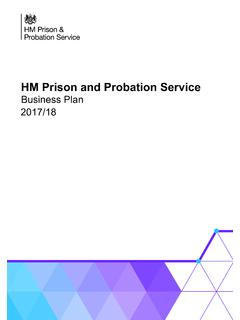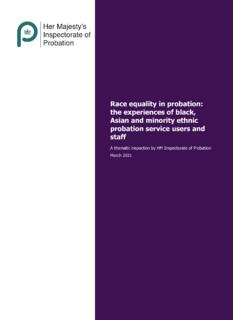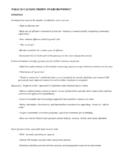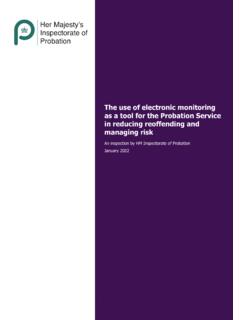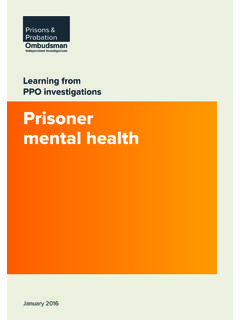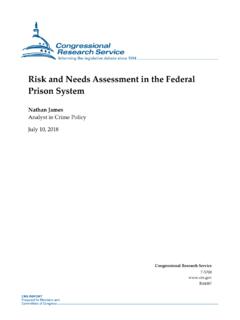Transcription of Policy Framework Name: Incentives Policy Framework 16 ...
1 Policy Framework Name: Incentives Policy Framework Re-issue Date: 1 September 2022 Implementation Date: - 16 August 2019: Use of Entry level ceases. All new prisoners must not join the Incentives scheme below Standard level and all prisoners on Entry level must be moved to Standard level. Paragraphs and of PSI 30/2013 will no longer apply from this date. 27 September 2019: Incentive Forums must be in place and comply with of this Policy Framework . 13 January 2020: A local Policy must be in place which fully complies with this Policy Framework . Replaces the following documents ( PSIs, PSOs, Custodial Service Specs) which are hereby cancelled with effect from 13 January 2020: PSI 30/2013 Incentives and Earned Privileges PSI 11/2011 Incentives and Earned Privileges Residential services Service Specification; Outputs 4, 5, and 6.
2 Action required by: HMPPS HQ Governors Public Sector Prisons Heads of Group Contracted Prisons Contract Managers in probation Trusts National probation Service Community Rehabilitation Companies (CRCs) HMPPS Rehabilitation Contract services Team HMPPS-run Immigration Removal Centres (IRCs) Other providers of probation and Community services Under 18 Young Offender Institutions Mandatory Actions: All groups referenced above must adhere to the Requirements section of this Policy Framework , which contains all mandatory actions. By the implementation date Governors1 of Public Sector Prisons and Contracted Prisons must ensure that their local procedures achieve the required Outcomes and comply with the Requirements and Constraints as set out in this Policy Framework .
3 Governors must also ensure that any new local policies that they develop as a result of this Policy Framework are compliant with relevant legislation, including the Public-Sector Equality Duty (Equality Act 2010). Guidance for Governors in planning local delivery in response to Policy Frameworks is available at 1 In this document the term Governor also applies to Directors of Contracted Prisons Incentives Policy Framework Re-issued: 1 Sept 2022 2 Audit/monitoring: Monitoring arrangements will be developed in collaboration with HMPPS. Resource impact: Governors will need to consider locally the impact that any new local Policy which they develop will have on their resources.
4 Contact: Deputy/Group Director sign-off: Rachel Pascual, Deputy Director, Safety, Security and Operational Policy Approved by Change Board for Publication: 10 July 2019 Revisions Date Changes 19 Dec 2019 Paras: ; ; ; changes to Annex A, C, F; and the addition of Annex I 07 Feb 2020 Para: , reference to Chapter 11 of the PPM should read Chapter 10. 12 Mar 2020 NFL updated to allow alarm clocks/watches with a digital display but no smart watches. 8 July 2020 Updates to Annex C and D in relation to the use of Nintento and Xbox game consoles. 1 Sept 2022 Private cash levels have been increased by 10%. The new rates (See paragraph ) take effect from 1 September 2022.
5 Incentives Policy Framework Re-issued: 1 Sept 2022 3 CONTENTS Section Title Page 1 Purpose 5 2 Context 5 3 Evidence 5-6 4 Outcomes 6 5 Requirements 6-14 Legal Requirements 6-7 Incentives Scheme Structures 7 Criteria for Progression 7-8 Role of the Keyworker 8 Reviews 8 Reviews for New Prisoners 9 Other Review Requirements 9 Appeals 9 Incentives Forum for Staff and Prisoners 9 Communication 9-10 Facilities List 10 Games Consoles 10 Property and Transfers 10 Earnable Incentives 11 Access to Private Cash 11 Eligibility to Earn Higher Rates of Pay 11 In-cell Televisions 12 Opportunity to Wear Own Clothes 12 Additional Time Out of Cell 13 Extra and Improved Visits 13
6 Handing and Sending In 13 6 Constraints 14 7 Guidance 14-20 Evidence-based Guidance for an Effective Local Incentives Policy 14-15 Reinforcing Positive Behaviours is More Effective than Punishing Undesirable Behaviours 14 Incentives Policy Framework Re-issued: 1 Sept 2022 4 Principles of an Effective Local Scheme 14-15 Procedural justice Positive Perceptions of Fairness Increase Compliance and Cooperation 15 Review Considerations - Commendations and Behaviour Warnings 15 Adjudications and Local Policies 16 Transfers 16 Release on Temporary Licence and the Incentives Policy 16 Enhanced Wings 16-17 Considerations for Prisoners with Specific Requirements 17-19 Annex A Behaviour Principles and Incentive Level Definition 20 Annex B Equalities Guidance & Principles for Implementation of Fair and Effective Incentive Forums 21-22 Annex C National Facilities List 23-28 Annex D Games Consoles and Games 29 Annex E Suggested Compact
7 For Prisoners who have a TV set 30-31 Annex F Sending and Handing In of Books to Prisoners 32-33 Annex G Guidance on How to Locally Adjust Central Private Cash Limits 34 Annex H Incentives Policy Compliance Checklist 35 Annex I Authorisation of Proprietary Bluetooth Stereos/Radios and HMPPS Bluetooth Guide 36 Incentives Policy Framework Re-issued: 1 Sept 2022 5 1. Purpose The system of privileges is a key tool for incentivising prisoners to abide by the rules and engage in the prison regime and rehabilitation, including education, work and substance misuse interventions whilst allowing privileges to be taken away from those who behave poorly or refuse to engage.
8 This Policy sets a common Framework with which local Incentives policies must comply. 2. Context The Incentives Policy Framework , together with other key policies, such as Adjudications, and for Young Offender Institutions (YOIs), the Building Bridges Policy Framework , allows Governors to incentivise good behaviour and tackle poor behaviour and breaches of the Prison Rules and YOI Rules, helping prisoners to make the right choices to prepare them to lead crime-free lives when they leave prison. 3. Evidence There are three important areas of evidence that can help Governors to implement more effective Incentives schemes. These include how fairly procedures are seen to be implemented (sometimes called procedural justice), the use of positive reinforcement, and the design and monitoring of the scheme itself.
9 Further guidance on how to translate this evidence into everyday practice is given in Section 7 (Guidance). Research on the impact of fair procedures, shows that: When people believe the process of applying rules (how a decision is made, rather than what decision is made) is fair, it influences their views and behaviour. When people feel processes are applied fairly, they have more confidence and trust in authority figures, see authority figures as being more legitimate, and they are more likely to accept and abide by decisions and rules, and comply and cooperate with authority, even if the outcome is not in their favour. When prisoners perceive authority to be used in a more procedurally just way, this predicts significantly less misconduct and violence, better psychological health, and lower rates of reoffending after release.
10 Research on behaviour change shows positive reinforcement is more effective at shaping people s behaviour than punishing them. Punishment may be required, but on its own it does not effectively change behaviour or deter people from impulsive actions. Punishment can result in compliance, but not the internalisation of values and so works less well in securing positive lasting behaviour change. Evidence also points to a range of other challenges that can result from punishment, such as aggression and damaged relationships with the punisher. Positively reinforcing desirable behaviour, on the other hand, can produce robust gains in a variety of desired behaviours; this approach teaches an individual what to do.










